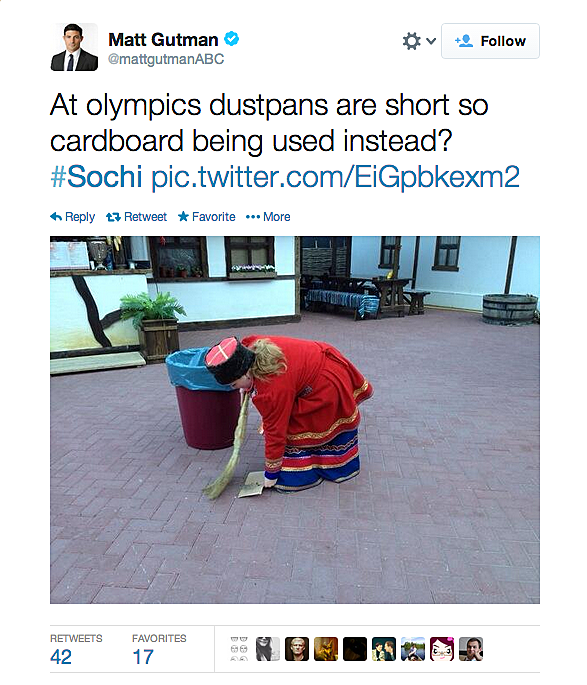Internet Histories | 10 February
Teaching empathy to medical students, what the internet is doing to news, and what we're learning (and not) from this year's Olympics.
This week:
Teaching empathy to doctors | What the internet is doing to news
The Olympics and how history repeats
Rosabel
[caption id="attachment_8699" align="aligncenter" width="500"] Actual image search result for 'doctors empathy'[/caption]
In this month’s issue of The Believer, Leslie Jamison writes about her work as a medical actor, one of those hard-to-believe jobs that involves pretending to be in various states of infirm to test medical students’ abilities to diagnose and to care.
We play a demographic menagerie: young jocks with ACL injuries and business executives nursing coke habits. STD Grandma has just cheated on her husband of forty years and has a case of gonorrhea to show for it. She hides behind her shame like a veil, and her med student is supposed to part the curtain. If he’s asking the right questions, she’ll have a simulated crying breakdown halfway through the encounter.
She weaves into this her experience of having an abortion and heart surgery in the same year:
My mother insisted I call Dr. M to tell her I was having an abortion. What if there was something I needed to tell the doctors before they performed it? That was the reasoning. I put off the call until I couldn’t put it off any longer. The thought of telling a near stranger that I was having an abortion—over the phone, without being asked—seemed mortifying. It was like I’d be peeling off the bandage on a wound she hadn’t asked to see.
When I finally got her on the phone, she sounded harried and impatient. I told her quickly. Her voice was cold: “And what do you want to know from me?”
We feel sympathy for this. We want our doctors to care about us. We want them to be concerned about our well-being. We want them to understand that what we're going through is scary, and not the third case of this they've seen that day. Our desire for this is attested to by the fat strand of research focused on developing empathy in medical students. It's important, because psychological well-being is crucial to how we cope and heal, and being made to feel unimportant, stupid, or with only a slim chance of living means we'll start to believe it too.
But for all our criticism, it’s worth taking a step back to consider what expectations we're placing on our medical professionals. They work crazily long hours in a cognitively and physically demanding role. We're constantly enhancing the efficiency of our healthcare system through technological and scientific advances, but what we miss in these discussions is something that will always be difficult to streamline:
Empathy isn’t just remembering to say That must really be hard, it’s figuring out how to bring difficulty into the light so it can be seen at all. Empathy isn’t just listening, it’s asking the questions whose answers need to be listened to. Empathy requires inquiry as much as imagination. Empathy requires knowing you know nothing. Empathy means acknowledging a horizon of context that extends perpetually beyond what you can see: an old woman’s gonorrhea is connected to her guilt is connected to her marriage is connected to her children is connected to the days when she was a child. All this is connected to her domestically stifled mother, in turn, and to her parents’ unbroken marriage; maybe everything traces its roots to her very first period, how it shamed and thrilled her.
Empathy means realizing no trauma has discrete edges. Trauma bleeds. Out of wounds and across boundaries. Sadness becomes a seizure. Empathy demands another kind of porousness in response.
As we continue streamlining our delivery of healthcare - and don't get me wrong, these are mostly all positive advancements - it's worth keeping in mind that if more and more people are coming through the door, this means expecting doctors to understand more and more lives with the same level of consideration and thought (and without the distress that might threaten to accompany it) in the same amount of time.
Matt
In The Information: A history, a theory, a flood, James Gleick describes how we’ve come to recognise and transmit information, from African talking drums to the internet. There’s this bit that deals with Babbage (of Difference Engine fame):
An important London banker told Babbage he disapproved [of steam engines]: “It will enable our clerks to plunder us, and be off to Liverpool on their way to America at a rate of twenty miles per hour.” Babbage could only express the hope that science might yet find a remedy for the problem it had created. “Possibly we might send lightning to outstrip the culprit.”
Two centuries later and we’re all culprits, and lightning’s more master than slave. When the Wall Street Journal tweeted that Philip Seymour Hoffman had died, it meant that
Twitter and, within the space of seven minutes, the Internet-accessing world may have known that Philip Seymour Hoffman had been found dead in his apartment before his three young children, with whom he was scheduled to spend the day, and his longtime partner, Mimi O’Donnell.
Our Brave New world-esque fixation on celebrity and access isn’t a particularly new point of cultural criticism, but what strikes me here is the rapidity and coherence of this intelligence. Digital technology means our gossip is now perfectly reproducible, no longer subject to the messy noise inherent in any game of Chinese Whispers. There are still errors of interpretation, but – theoretically at least – we can now trace the rise and fall of pop-cultural moments, map them against time and geography, watch the lightning jump from node to node.
What such optimistic readings of enhanced transmissibility ignore is the fact lightning travels along the path of least resistance, jumping some of us entirely. It’s easy to say ‘we’re all more connected now than ever’, but who do we mean by ‘we’? In an excoriating piece, D. Watkins, a Black man writing out of Baltimore, rips to shreds any notion that the internet’s somehow leveled the playing field:
Ten-plus years and three college degrees later, I’m back where I started, just like my card-playing friends: too poor to participate in pop culture. Too poor to give a fuck about a selfie or what Kanye said or Beyoncé’s new album and the 17 videos it came with.
News is faster these days, but are we really any better at pushing it deeper, in terms of both content and reach?
Joe
[caption id="attachment_8702" align="aligncenter" width="587"] Oh my god people in the developing world making do with limited resources are succccccccch idiots[/caption]
Ten days before the start of the 1968 Summer Olympics in Mexico, Gustazo Diaz Ordaz’s ordered the forcible breakup of a student sitin at Plaza de las Tres Culuturas in Tlatelolco. 5,000 soldiers, 200 tanks, and dozens of trucks surrounded the plaza. When the crowd began panicking, soldiers opened fire into the crowd and nearby buildings alike. Estimates place the death toll at up to three hundred people. To this day, survivors allege that the Olympia Battalion, a secret government security branch set up to protect the sanctity of the games, shot first.
In 1995, the eternal bridesmaid of the Winter Olympics, Salt Lake City, Utah (it had tried to get awarded the games four times without luck) suddenly achieved the seemingly impossible. Three years later, it was revealed that the Salt Lake Organising Committee had paid the tuition of one IOC member’s children. Others had secured land purchase agreeements; still others received political campaign donations. The International Olympic Committee made an exhaustive song and dance about this one-off breach of trust. Then it was revealed that the IOC had been warned about the corrupt behavior of their own officials almost a decade before.
Leading up to the 2008 Olympics, one to two million migrant workers travelled to Beijing to toil night and day on its construction sites. They worked without the basic safety nets of medical or accident insurance, unions, the ability to enforce their contracts. Unable to afford to return home, let alone find work in the provinces they came from, Human Rights Watchsuggested that the people who built the Olympics were effectively indentured.
And elsewhere, a trail of big infrastructural voids and deficits for a decade afterwards. Sydney in 2000, Athens in 2004 – spiraling budgets, contractors upon contractors that were never reclaimed by the tourist hordes everyone forecast.
Point being: there’s a lot of smug coverage of the Sochi Winter Olympics right now. The hotel rooms are dowdy, the water is ochre, gin is sold in plastic 1.5 litre mixers, eccentric old people do backbreaking manual labour for our Twitter stream. Oh yeah also there’s a bunch of crackdowns on protest and forcible relocation as well. The vaguely racist caricature of Russia as a nation of stoic buffoons is fucking dumb because it allows us to pat ourselves on the back for our more insidious versions of the same thing (rumour has it even New Zealand itself had an issue where the government legislated at the behest of big companies to make shitty and incomplete buildings full of mould…hard 2 believe..someone pls confirm?). Plus, this is the Olympics. This is what it’s always like, at the bottom of everything.
It’s a free-for-all for officials and their contractor buddies. It’s open season on a bunch of city governments looking for a salve from above. It’s a wait-and-see for the catastrophic panics that happen when you try to rebuild a city on an event-based contract (most stuff this size never has to be done by Feb or else). It’s life-destroying news for everyone who’s caught in the way by dint of their belief, location, or status. This should take nothing away from the achievements of the athletes, the heroics and the tears – but the trick is to recognize these things exist together. It’s not just the last true noble post-ideological event gone wrong cos you gotta watch another dude dook. It never was.
Also, I guarantee one NZ election campaign in the next twenty years will involve an Olympic bid, and it’s your party that will embarrass yourself by vowing to make it. I’ll register @aucklandhoteldebacle now.


